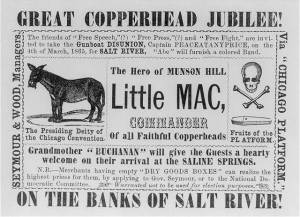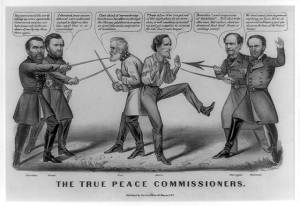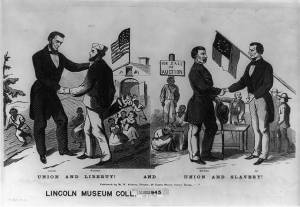According to this editorial, if conservatives don’t like change, they should vote for President Lincoln because 1) a change in administrations would mean a huge change in the federal civil bureaucracy and military organization, which Davis and Lee would try to exploit. 2) Copperheads would still be pushing for an armistice and peace, which would result in an accepted Confederate nation 3) The war has changed society and culture – abolitionism is now the status quo.
From The New-York Times
A Few Words to Conservatives.
It has always been a matter of congratulation to this journal, that so considerable a number of its readers were — from the so-called “conservative” classes — from those who have property interests to conserve, and important stakes in the welfare of the country, as well as those whose habits of mind and of life lead them to oppose sudden changes and spasmodic reforms.
To these citizens this election is an immensely important event, and they do well to carefully consider how their vote is to be given. For, if a mistake be made on either side, the shock to property and all the best interests of the nation, will be beyond any experience of our history. No doubt a certain proportion of these men are inclined to give their votes to Gen. MCCLELLAN, from motives of personal sympathy or friendship with him, or from the habit of having often acted with his party. But the question must come up, “Will it be safe?”
Supposing Gen. MCCLELLAN to entirely break from his party — which we do not believe probable — his election will be the signal, according to the ancient and absurd custom of the country, for an entire change of the civil administration of the nation. Every postmaster and tax-collector, all the Government officials throughout the land, all the bureaux at Washington, the ministers and cabinet, must all abandon their posts, and at once admit a new and inexperienced host of executive officers throughout the nation. More than this, the whole military system may be at once overturned, and new men put in, in every position of responsibility. Quartermasters, assistants, commanders of posts, and even the Generals of our armies, may all be relieved, and the favorites or partisans of the new President be set in their places.
In the face of such powerful and skillful adversaries as we have, a revolutionary change like this, dangerous even in time o[f] peace, would be perilous in the extreme. To make such a revolution as this, with men like DAVIS and LEE watching for a weak point, would be suicidal. A civil war and a domestic upturning like this, would be more than even the strength of our people could bear.
We know our present officials, civil and military. We certainly could not find better officers than GRANT and SHERMAN and FARRAGUT and SHERIDAN. It is doubtful if any portion of our civil affairs would be any better managed by new men, while a change would certainly be dangerous.
More than this, we submit to these gentlemen, that whatever confidence they may have in MCCLELLAN, personally, he must, to a certain degree, follow his party, and will without doubt, be influenced by the leaders of that party — such men as SEYMOUR, PENDLETON, VALLANDIGHAM and WOOD. The latter are certainly not safe or “Conservative” men. They have pledged themselves to peace and an armistice. We have abundantly proved that this can mean nothing but the independence of the rebel Confederacy. The whole world sees that, and the Tory journals of England rejoice at it, for they know that it includes the repudiation of our debt, the disorganization of our Union, the destruction of every competing material interest, and endless war and anarchy — as we have before shown. Their call for a “Convention of the States” can mean nothing but revolution, and there is every reason to think that those western Copperheads want a “Northwestern Confederacy,” Such men are political adventurers, dangerous in all their schemes to the peace and welfare of the country.
Still more, we call the attention of our conservative readers to the fact that a great change has come over the country, and that now Anti-Slavery is the conservative element, and Slavery the revolutionary. It is clear that there can be no permanent quiet or prosperity in this land, while Slavery exists as a power. Its destruction is the only possible condition of safety to property and of lasting good-will between the different sections. The war has changed all our relations to it. The dullest can see what a volcano of war and revolution is hidden beneath the crust of the “domestic institution.” There can be no peace till Freedom and respect for labor rule every community under our national banner. All the property of the country is now intervolved with the success of the Anti-Slavery principle. The success of the Chicago platform would, by securing the recognition of the Confederacy, give a new lease of life to Slavery, and extend our life-and-death struggle with it, for a century.
Every interest of property, then, every wise consideration against sudden change, every respect for a future of security and good older, are on the side of the Union party.
The Times certainly knew how overwhelming the patronage job could be for a new president (and here)
You can read about the second political cartoon at the Library of Congress. The first one is here



